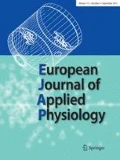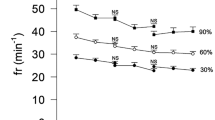Abstract
It has been demonstrated that there are no sex differences in the oxygen uptake (V̇O2) kinetic response to moderate intensity exercise. However, sex differences in the response to maximal exercise are readily apparent even in the prepubertal years. The purpose of this study was therefore to investigate if sex differences exist in the V̇O2 kinetic response to heavy-intensity exercise. Forty-eight prepubertal children (25 male, 23 female) completed four transitions from baseline to 40% of the difference between their previously determined TV-slope (ventilatory threshold determined by the V-slope method) and peak V̇O2 on an electronically braked cycle ergometer. Each subject’s breath-by-breath responses were interpolated to 1 s intervals, time aligned and averaged. The data following phase 1 were fit with: (1) a double exponential model and (2) a single exponential model within a fitting window that was previously identified to exclude the slow component. There were no significant differences in the parameters of the primary component between each model. Subsequent analysis was carried out using model 2. The primary time constant (τ1) was significantly (P<0.05) faster in boys [17.6 (5.8) s] than girls [21.9 (8.2) s], and the slow component contribution to the total change in amplitude after 9 min was significantly greater in girls [11.8 (5.5)%] than boys [8.9 (3.7)%]. Sex differences in the kinetic response to heavy-intensity exercise were identified and suggest that during the prepubertal years, sex differences exist in the ability to deliver and/or utilise oxygen in children.


Similar content being viewed by others
References
Armon Y, Cooper DM, Flores R, Zanconato S, Barstow TJ (1991) Oxygen uptake dynamics during high-intensity exercise in children and adults. J Appl Physiol 70:841–848
Armstrong N (1998) Young people’s physical activity patterns as assessed by heart rate monitoring. J Sports Sci 16:S9–S16
Armstrong N, Welsman J (2000) Development of aerobic fitness during childhood and adolescence. Pediatr Exerc Sci 12:128–149
Armstrong N, Welsman JR (2002) Cardiovascular responses to submaximal treadmill running in 11 to 13 year olds. Acta Paediatr 91:125–131
Armstrong N, Kirby BJ, McManus AM, Welsman JR (1995) Aerobic fitness of pre-pubescent children. Ann Hum Biol 22:427–441
Armstrong N, Welsman JR, Kirby BJ (2000) Longitudinal changes in 11–13-year-olds physical activity. Acta Paediatr 89:775–780
Barstow TJ, Jones AM, Nguyen PH, Casaburi R (1996) Influence of muscle fiber type and pedal frequency on oxygen uptake kinetics of heavy exercise. J Appl Physiol 81:1642–1650
Beaver WL, Wasserman K, Whipp BJ (1986) A new method for detecting anaerobic threshold by gas exchange. J Appl Physiol 60:2020–2027
Bell C, Paterson DH, Kowalchuk JM, Padilla J, Cunningham DA (2001) A comparison of modelling techniques used to characterise oxygen uptake kinetics during the on-transient of exercise. Exp Physiol 86:667–676
Bell RD, MacDougall JD, Billeter R, Howald H (1980) Muscle fibre types and morphometric analysis of skeletal muscle in six-year-old children. Med Sci Sports Exerc 12:28–31
Burnley M, Jones AM, Carter H, Doust JH (2000) Effects of prior heavy exercise on phase II pulmonary oxygen uptake kinetics during heavy exercise. J Appl Physiol 89:1387–1396
Capelli C, Cautero M, di Prampero PE (2001) New perspectives in breath-by-breath determination of alveolar gas exchange in humans. Pflugers Arch 441:566–577
Cautero M, Beltrami AP, di Prampero PE, Capelli C (2002) Breath-by-breath alveolar oxygen transfer at the onset of step exercise in humans: methodological implications. Eur J Appl Physiol 88:203–213
Fawkner SG, Armstrong N (2003a) Oxygen uptake kinetic response to exercise in children. Sports Med 33:651–669
Fawkner SG, Armstrong N (2003b) The slow component response of V̇O2 to heavy intensity exercise in children. In: Reilly T, Marfell-Jones M (eds) Kinanthopometry VIII. Chapman Taylor, London, pp 105–113
Fawkner SG, Armstrong N (2004) Longitudinal changes in the response to heavy intensity exercise in children. J Appl Physiol 97:460–466
Fawkner SG, Armstrong N, Childs DJ, Welsman JR (2002a) Reliability of the visually identified ventilatory threshold and V-slope in children. Pediatr Exerc Sci 14:181–193
Fawkner SG, Armstrong N, Potter CR, Welsman JR (2002b) V̇O2 kinetics in children and adults following the onset of moderate intensity exercise. J Sports Sci 20:319–326
Gaesser GA, Poole DC (1996) The slow component of oxygen uptake kinetics in humans. Exerc Sport Sci Rev 24:35–71
Glenmark B, Hedberg G, Jansson E (1992) Changes in muscle fibre type from adolescence to adulthood in women and men. Acta Physiol. Scand 146:251–259
Grassi B, Hogan MC, Kelley KM, Aschenbach WG, Hamann JJ, Evans RK, Patillo RE, Gladden LB (2000) Role of convective O2 delivery in determining V̇O2 on-kinetics in canine muscle contracting at peak V̇O2. J Appl Physiol 89:1293–1301
Hebestreit H, Kreimler S, Hughson RL, Bar-Or O (1998) Kinetics of oxygen uptake at the onset of exercise in boys and men. J Appl Physiol 85:1833–1841
MacDonald M, Pedersen PK, Hughson RL (1997) Acceleration of O2 kinetics in heavy submaximal exercise by hyperoxia and by prior high-intensity exercise. J Appl Physiol 83:1318–1325
Mácek M, Vávra J (1980) The adjustment of oxygen uptake at the onset of exercise: a comparison between prepubertal boys and young adults. Int J Sport Med 1:70–72
Obert P, Cleuziou C, Candau R, Courteix D, Lecoq A, Guenon P (2000) The slow component of O2 uptake kinetics during high-intensity exercise in trained and untrained prepubertal children. Int J Sports Med 21:31–36
Özyener F, Rossiter HB, Ward SA, Whipp BJ (2001) Influence of exercise intensity on the on- and off- transient kinetics of pulmonary oxygen uptake in humans. J Physiol (Lond) 553:891–902
Poole DC (1994) Role of exercising muscle in slow component of V̇O2. Med Sci Sports Exerc 26:1335–1340
Poole DC, Schaffartzik W, Knight DR, Derion T, Kennedy B, Guy HJ, Prediletto R, Wagner PD (1991) Contribution of exercising legs to the slow component of oxygen uptake kinetics in humans. J Appl Physiol 71:1245–1253
Pringle JS, Doust JH, Carter H, Tolfrey K, Campbell IT, Jones AM (2003) Oxygen uptake kinetics during moderate, heavy and severe intensity ‘submaximal’ exercise in humans: the influence of muscle fibre type and capillarisation. Eur J Appl Physiol 89:289–300
Rossiter HB, Ward SA, Howe FA, Kowalchuk JM, Griffiths JR, Whipp BJ (2002) Dynamics of intramuscular 31P-MRS P(i) peak splitting and the slow components of PCr and O2 uptake during exercise. J Appl Physiol 93:2059–2069
Rowland TW (2000) Cardiovascular function. In: Armstrong N, van Mechelen W (eds) Paediatric exercise science and medicine. Oxford University Press, Oxford, pp 163–171
Sady SP (1981) Transient oxygen uptake and heart rate responses at the onset of relative endurance exercise in prepubertal boys and adult men. Int J Sports Med 2:240–244
Tanner JM (1962) Growth at adolescence. Blackwell Scientific, Oxford, UK
Tschakovsky ME, Hughson RL (1999) Interaction of factors determining oxygen uptake at the onset of exercise. J Appl Physiol 86:1101–1113
Whipp BJ, Ward SA, Lamarra N, Davis JA, Wasserman K (1982) Parameters of ventilatory and gas exchange dynamics during exercise. J Appl Physiol 52:1506–1513
Williams CA, Carter H, Jones AM, Doust JH (2001) Oxygen uptake kinetics during treadmill running in boys and men. J Appl Physiol 90:1700–1706
Yoshida T, Yamamoto K, Udo M (1993) Relationship between cardiac output and oxygen uptake at the onset of exercise. Eur J Appl Physiol 66:155–160
Zanconato S, Cooper DM, Armon Y (1991) Oxygen cost and oxygen uptake dynamics and recovery with 1 min of exercise in children and adults. J Appl Physiol 71:993–998
Acknowledgement
The work was supported by the Community Fund and the Darlington Trust.
Author information
Authors and Affiliations
Corresponding author
Rights and permissions
About this article
Cite this article
Fawkner, S.G., Armstrong, N. Sex differences in the oxygen uptake kinetic response to heavy-intensity exercise in prepubertal children. Eur J Appl Physiol 93, 210–216 (2004). https://doi.org/10.1007/s00421-004-1201-7
Accepted:
Published:
Issue Date:
DOI: https://doi.org/10.1007/s00421-004-1201-7




